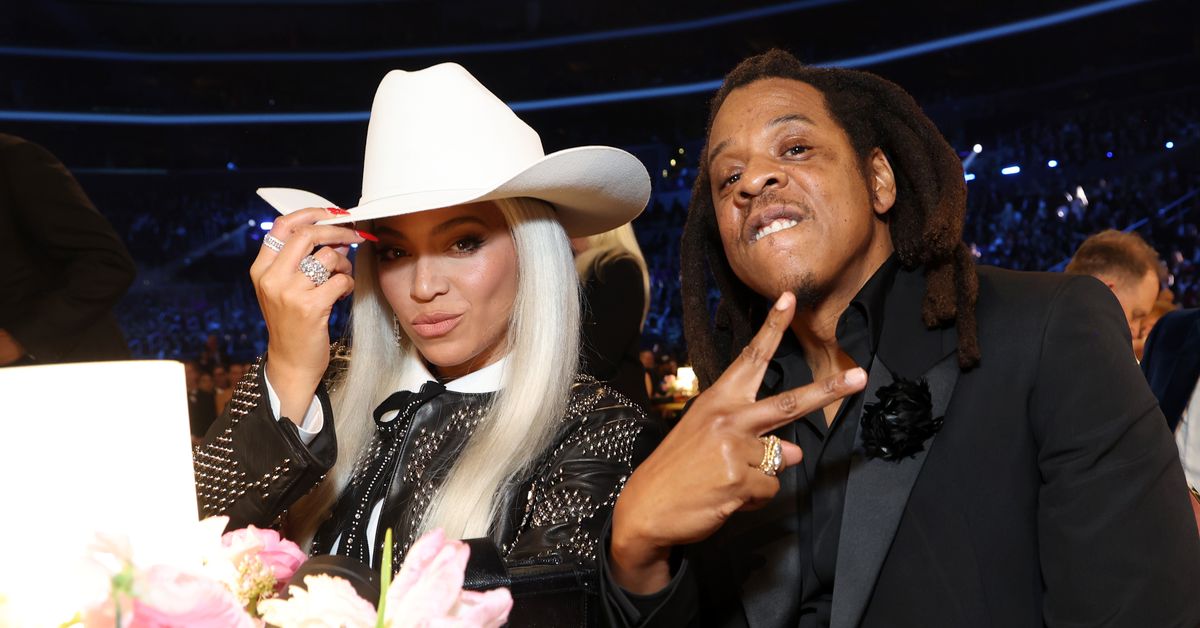There’s long been outrage over the Grammys’ Beyoncé snubs for the awards show’s highest honor — omissions that have infuriated fans and prominent celebrities alike.
At the 2024 awards on February 4, Beyonce’s husband, Jay-Z, became the latest to call them out, castigating the show for its history of overlooking Black artists, including his superstar wife.
“We want y’all to get it right — at least get it close to right,” Jay-Z said. “I don’t want to embarrass this young lady, but she has more Grammys than everyone and never won Album of the Year. So even by your own metrics that doesn’t work.”
He became the latest of many prominent figures who’ve raised this point in some fashion, including the likes of Adele and, famously, Kanye West in the past. Increasingly, the references to Beyoncé being overlooked by institutions like the Grammys and the MTV Video Music Awards have become more common both because of how egregious they feel on the merits and also because of what they represent.
Beyond serving as an insult to her undeniable talent, Beyoncé’s treatment and the specific awards she has and hasn’t won have become emblematic of the exclusion of Black art by the music establishment. They are often cited as some of the most prominent examples that capture this problem.
Why some awards matter more than others
As Jay-Z noted, Beyoncé has the most Grammys of any musical artist — 32 — but she’s never won the coveted Album of the Year award. AOTY is widely considered the most prestigious honor of the show, much like Best Director or Best Picture is for the Oscars, and it’s often treated like the greatest recognition that the program has on offer.
Beyoncé has been nominated for AOTY four times as a solo artist but has lost out each time. In 2010, she was nominated for I Am … Sasha Fierce, which lost to Taylor Swift’s Fearless. In 2015, she was nominated for Beyoncé, which lost to Beck’s Morning Phase. In 2017, she was nominated for Lemonade, which lost to Adele’s 25. And in 2023, she was nominated for Renaissance, which lost to Harry Styles’s Harry’s House.
In 2017, the year that Lemonade lost, Adele spoke about it explicitly in her AOTY acceptance speech and emphasized the cultural impact that Beyoncé’s record had had. “I can’t possibly accept this award. And I’m very humbled and I’m very grateful and gracious. But my artist of my life is Beyoncé. And this album to me, the Lemonade album, is just so monumental,” Adele said.
As the most important honor of the show, AOTY sends a powerful signal regarding the cultural impact that an artist has had, making Beyoncé’s longstanding exclusion from a win in that category especially significant.
Notably, despite winning 32 Grammys, she has only won one of what are known as the “Big Four” awards of the show: Album of the Year, Record of the Year, Song of the Year, and Best New Artist. In 2010, she won Song of the Year for her hit song “Single Ladies.”
What the Beyoncé snubs represent
This history is ultimately indicative of the Grammys’ and other organizations’ much deeper problems with race. In addition to the Grammys, both the Oscars and the Golden Globes have been scrutinized for excluding Black artists.
Beyoncé’s losses (and, in some cases, lack of recognition outright) in key categories underscore how Black artists have been overlooked for the most prestigious awards at the Grammys. Per a 2021 study from the USC Annenberg Inclusion Initiative, Black artists constituted 38 percent of all artists on Billboard’s Top 100 between 2012 to 2020 but just 26.7 percent of Grammy nominees for the Big Four awards in that timeframe.
All told, 11 Black artists have won AOTY in the Grammys’ more than 60-year history, and just three of those artists are women. The last time a Black woman won AOTY was 25 years ago, when Lauryn Hill won for The Miseducation of Lauryn Hill in 1999.
As Vulture put it in its write-up of Taylor Swift’s fourth AOTY win this past weekend, Swift “broke the record for most AOTY wins of all time — and now has more wins in the category than all Black women combined.”
There are other reasons the Grammys have long had a credibility issue with the hip-hop community, as A.D. Carson, a professor of hip-hop at the University of Virginia, wrote for the Washington Post in 2022. Jay-Z alluded to some examples of this exclusion in his Sunday remarks, describing how DJ Jazzy Jeff and Will Smith boycotted the Grammy Awards in 1989 when they won the first Grammy for best rap performance because the show wouldn’t televise the presentation of the new award.
The Grammys’ history of confining Black artist nominations to certain categories, such as rap and hip-hop, has also drawn scrutiny, Carson writes. And there have been concerns that the list of Black artists the show has chosen to elevate underscores, in his words, a “trend of respected rap artists being overlooked in favor of those who crossed over into pop music and gained the most White fans.”
As Jay-Z noted, he boycotted the Grammys in 1999 when he won for best rap album because DMX was not nominated for two successful albums that had come out in 1998. He also talked in his and Beyoncé’s 2018 song “Apeshit” about his string of losses despite getting several nominations, writing, “Tell the Grammys fuck that 0 for 8 shit.”
More recently, artists including Drake, Nicki Minaj, and Teyana Taylor have boycotted the Grammys in protest of the show’s treatment of Black musicians, too, the Slate reports.
The spotlight on Beyoncé’s snubs has only reignited scrutiny of this broader issue, highlighting how deep and systemic the inadequate recognition of Black artists continues to be.


